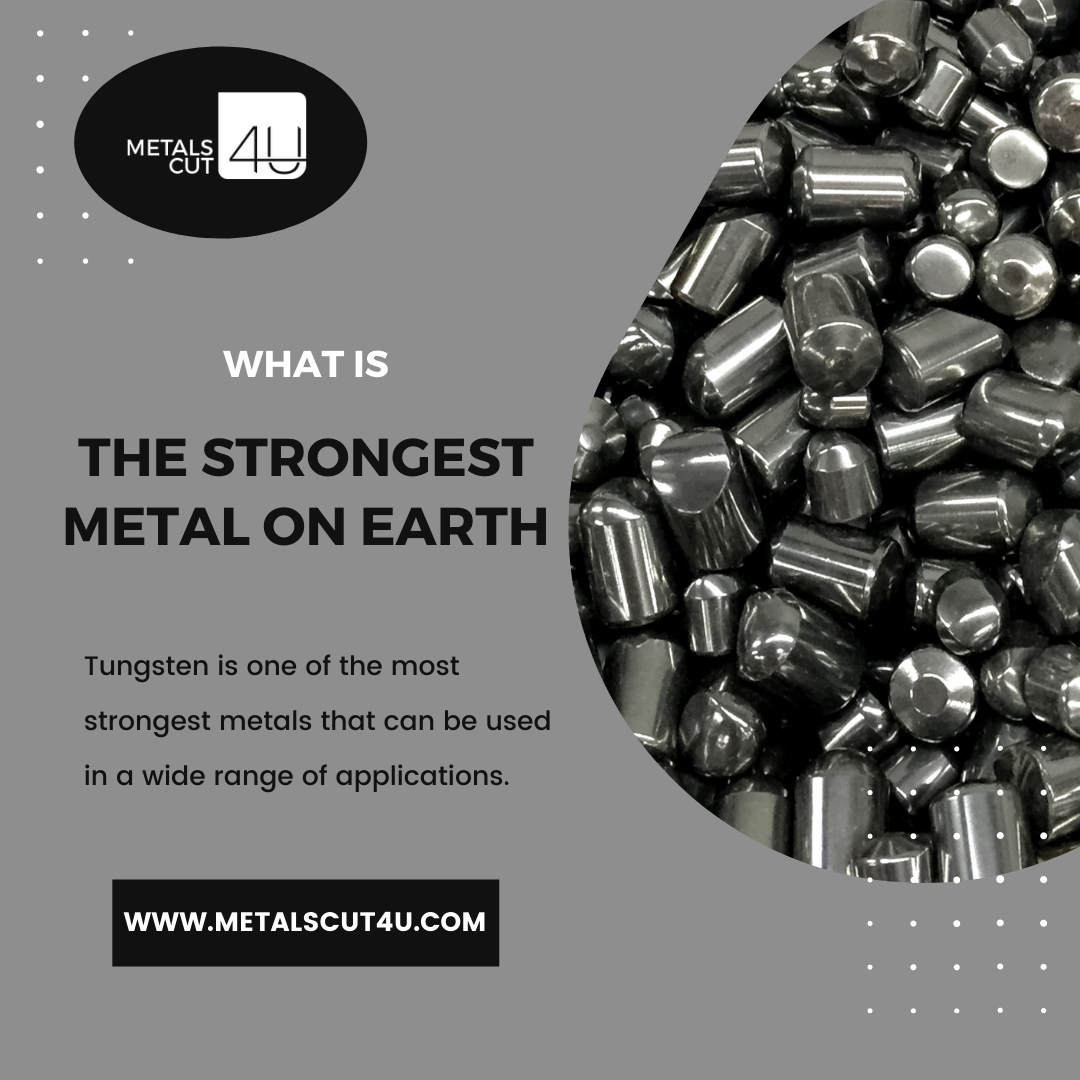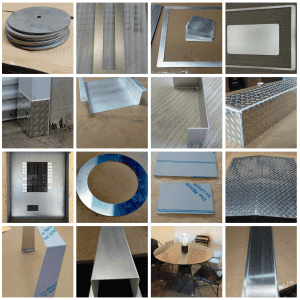What is The Strongest Metals On Earth?

When we talk about the toughness of metals there are many factors to consider such as yield and compressive strength, hardness, and several other properties. We rely on metals for all sorts of construction and technology purposes. At times due to a lack of awareness and knowledge, we tend to utilize metals that are not fit for a particular purpose. Choosing your type of metal wisely is extremely vital to building a strong foundation for your multiple applications and constructions.
From the strongest to weakest metals on the earth, we have covered it all. So without further ado, let’s explore this article.
Which is The Strongest Metal On Earth?
Tungsten is one of the strongest metals on Earth, with a remarkable strength of 1510 megapascals. It possesses the highest tensile strength of any pure metal, reaching an astonishing 500,000 psi. These exceptional attributes have led to its extensive use in bullets, missiles, metal evaporation work, paints, electron and television tubes, and glass-to-metal seals.
The melting point ranges over 3,000 degrees Fahrenheit, along with the greatest tensile strength of any natural metal. Tensile strength refers to the ability of the material to withstand any force or pressure without breaking.
Tungsten is often used in light bulbs as the filament for other heating elements. In the case of incandescent light bulbs tungsten, often serves as a base filament. The electricity flows through the tungsten filament, where it heats up and produces light. These filaments are high in conductive properties and thus responsible for creating an illuminating light in the bulbs. Furthermore, tungsten is also used in the production of many alloys such as high-speed steel and as a substitution for gold. It has properties similar to gold, which makes it a more desirable material for jewelry.
Top 8 Strongest Metals
Here is the list of the strongest metals on earth that you must consider using in your construction or other purposes.
1. Osmium
Osmium metals are well known for their bluish-white and extremely tough exteriors. Their melting point can be as high as 3030 degrees celsius, making them the toughest to break. They are not commonly used for construction purposes; rather they are mostly used in fountain pen nib tipping and electrical circuit components. Osmium is one of the densest naturally occurring metals on the earth. In spite of being one of the strongest metal materials, osmium tends to be softer than diamonds.
2. Stainless Steel
Stainless steel is partly constituted by chromium along with iron and carbon. Making it one of the excellent combination metal material choices in today's modern world. Steels are extensively used to hold up buildings, shells for vehicles, ship infrastructure, machines, electrical appliances, and weapons. Undoubtedly stainless is the most useful and prominent type of strongest metal in the market. They possess yield strength of up to 1,560 Mpa and tensile strength of up to 1,600 Mpa.
3. Chromium
Chromium is a distinctive silvery and shiny colored strongest metal that is too brittle to be used by itself for many purposes or applications. It is commonly alloyed with steel to make stainless steel and with other metals to make them harder. While in its natural state, chromium can be one of the hardest metals out there. Chromium can be an ideal choice for electroplating. It has a tensile strength of around 418 Mpa and a yield strength of 316 Mpa. It rates 9 on the Mohs hardness scale.
4. Titanium Aluminide
Titanium when combined with metals usually outrank most metals in the category of the strongest metal in the world. Titanium Aluminide is a specialized alloy composed of Titanium, Aluminum, and Vanadium. It is commonly known as Gamma Titanium Aluminide. It offers high-temperature performance with low weight for turbine blades. It can be as strong as nickel-based alloy but at the half weight of the metal. Titanium offers a tensile strength of 880 Mpa and yield strength of 800 Mpa.
5. Tungsten Carbide
Similar to Chromium, natural Tungsten is very brittle in nature. Therefore it becomes essential to combine tungsten with other materials to enhance their properties. Tungsten Carbide is a combination of carbon and tungsten metals. With this combination, we can expect a high impact resistant and strongest metal in the market. It is an ideal option for the construction of tools with cutting edge and for CNC machining industries. It has yield strength between 300 to 1500 Mpa and tensile strength up to 1,500 Mpa
6. Carbon Steel
Carbon steel alloy has been used for centuries for many purposes. It possesses all four properties of strength and hence is one of the widely used metals over the past decades. Carbon steel is an alloy of iron and carbon that defines strength. It is highly impact-resistant so you need not worry about much damage taking place. It has a yield strength of 260 MPa and tensile strength of about 580 Moa. Along with that, it has a score of 6 on the Mohs scale.
7. Magnesium Alloy
Magnesium Alloy is termed as one of the strongest and lightweight metals in today’s world. As a matter of fact, scientists are experimenting with this particular alloy. There are still so many factors yet to be discovered about magnesium alloy. Nevertheless, it is expected to be stronger than titanium alloy and lighter than aluminum metals. Also, it is suspected that if this metal is used in cars it would automatically save 40% of fuel without any modification required to the engine. We look forward to more efficient use of this particular alloy in the coming future.
8. Steel-iron Nickel Alloy
Iron and nickel both are considered the most abundant metals in meteorites and in the dense metal cores of the earth. There are few mixtures of this particular alloy available in the market. Moreover, mixing carbon steel with steel-iron nickel alloy can increase the yield and tensile strengths of standard carbon steel far above imagination. You can also combine this combination with other metals for better results. Steel-iron nickel alloy offers a yield strength of 1,420 Mpa and tensile strengths of 1,460 Mpa.
Types of Rust-resistant metals
Below we have mentioned 3 distinctive types of metals that don’t rust
1. Aluminum
Aluminum does not pose the properties of steel or iron which helps in reducing the chances of coercion drastically. It is a self-resistant metal that creates protection against corrosion. Aluminum when exposed to water it generates a thin layer of coating aluminum oxide that shields metal against corrosion. On the other hand, it remains resistant to moisture even when exposed to harsh weather conditions and can be used easily in different applications. It is extremely easy to bend or construct ant structure from aluminum metal, as it is one of the lightest metals out there.
2. Brass
Due to the negligible amount of iron properties present in brass, it becomes nearly impossible for brass to rust easily. However, it can oxidize when exposed to water. Brass oxidation hardens over the surface which is visible in green, blue, or blackish layers. Brass oxidation generally is only limited to the surface and does not affect the integrity of brass. It is a popular choice for decorative items, home fittings, and musical instruments.
3. Copper and Bronze
Copper can be found easily anywhere and bronze is simply another copper alloy that includes a combination of tin and other metals. Both copper and brass can be one ultimate option in most applications without worrying about corrosion and rust.
CONFIGURE IN 4 EASY STEPS
Is Diamond Stronger Than Titanium?
Titanium is one of the strongest pure metals in the world. However, the combination of metals with other materials is always stronger in comparison to single metals. Combination materials such as alloy and diamonds can easily stand out in quality and durability when compared with titanium. Diamonds are the hardest natural material in the world. Titanium certainly is not stronger and harder than diamonds. Diamonds’ strength ranges around 60GPa whereas titanium can be as low as .434Gpa or Gigapascals. On the other hand, Diamonds can easily outrank titanium in the scale of hardness, it ranges about 98.07 Rockwell C whereas, titanium ranges around 36 Rockwell C.
Diamonds are one the strongest gemstones made from carbon that has been under the greatest pressure and heat. They are found in depths of 87 to 120 miles of the earth’s mantle. The heat and pressure create the change in diamond molecules and force them to stick closely with each other which further restricts movements. Due to the closeness of these molecules a rigid bond takes place, therefore making diamonds one of the hardest materials on the planet.
What Metal is Harder Than Titanium?
The hardness of the metals generally depends on their strength density ratio, materials responsiveness towards scratch, and the hardness level on the Mohs hardness scale of these materials. The combination metals usually are stronger or harder than single metals such as Titanium. Carbon steel combines the strength of steel with the resilience of carbon molecules making them stronger and essentially supreme quality metals in comparison to Titaniums. Other metals such as Tungsten can easily rank higher than titanium as it poses the highest tensile strength and melting point of all metals. Being the strongest metal on the earth, Tungsten is often combined with steel and other metals to achieve stronger alloys.
As stated above, diamonds too are one such material that is harder than titanium. They take about 1-3.3 billion years to form a rigid or hard molecular bond that makes them the strongest material out there. Moving ahead, steel alloys is the strongest metal alloy currently available in the market. However, when titanium is combined with other metals such as aluminum or vanadium, it becomes stronger than most metals. Therefore, if you wish to use titanium for heavy use purposes, it is suggested that you should opt for titanium alloy rather than single metal titanium.
What is The Weakest Material on Earth?
Talc is often considered one of the softest or weakest materials on earth. It is made from silicon and oxygen that contains magnesium and water molecules arranged into the sheets of its crystal structure. Talc can score about 1 on the Moh hardness scale and be easily disrupted by simple scratching or shearing. Due to its softness and cleavage, talc becomes the perfect lubricant for purposes where it won’t be under too much pressure or stress, such as body powders. They possess weak chemical bonds that can be shattered effortlessly in no time.
Looking for custom metal parts that are made exclusively for your project? Get in touch with us and we will assist you with the same.
